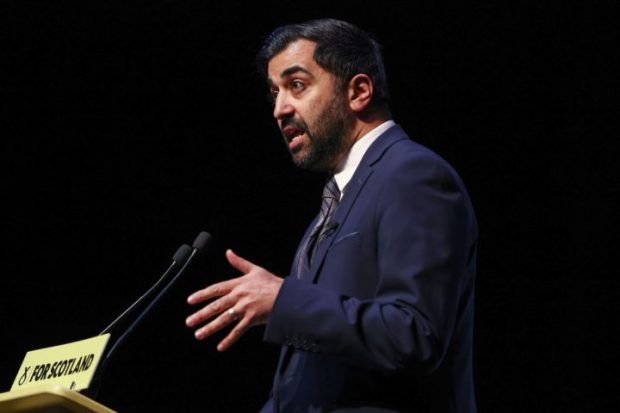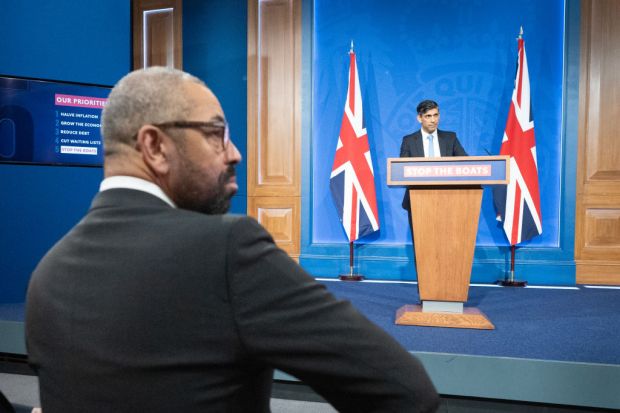The idea that a referendum on Scottish independence could be held without it having any bearing on the constitution of the United Kingdom was – though Lord Reed did not quite put it like this – utterly preposterous. This was what the Scottish government argued, however: Holyrood could legislate for a referendum because such a plebiscite would be of no consequence. As a matter of common sense this was evidently specious nonsense; as a matter of law, it is an argument which has been rejected by the Supreme Court today.
Sturgeon’s response was risible. Lord Reed’s judgement that Scotland is neither a colony nor an oppressed nation actually demonstrates that it is. According to the First Minister:
‘A law that doesn’t allow Scotland to choose our own future without Westminster consent exposes as myth any notion of the UK as a voluntary partnership.’
Shockingly, we’re told, this ‘makes (the) case for independence’. Since, in Sturgeon’s world, everything makes the case for independence this is of little consequence.
Her argument would, of course, enjoy greater weight if Scotland had not enjoyed – or endured – a referendum on independence just eight years ago. The barriers to a second referendum are higher than those applied to the matter on the first occasion when it was put. The SNP’s argument for a referendum now would be vastly stronger if David Cameron had not agreed a Section 30 order temporarily suspending the ordinary meaning of the Scotland Act. So strong, in fact, that I think they would have been unanswerable just as, in point of further fact, they were unanswerable in 2011.
Sturgeon’s proposal to fight the next general election as a ‘de facto referendum’ on independence is a sub-optimal way forward
From which it follows that while a pro-independence majority in the Scottish parliament is a necessary condition for a referendum it is not necessarily a sufficient one. If it were, there could be no reasonable or logical objection to holding referendums on the national question every five years until such time as the ‘correct’ result is achieved. (There are, for sure, plenty of SNP supporters, and indeed SNP parliamentarians, who do take precisely this view.) I submit this would be unreasonable, however. Votes of this consequence must have some meaning.
Nevertheless, in one respect the nationalists do have a point. If Holyrood cannot – and, in my view, quite reasonably cannot – unilaterally legislate for a referendum (or indeed for independence), what is the process by which Scotland could one day make its constitutional choice? A bill at Westminster could determine this but I rather doubt any such legislation will be introduced any time soon. This may be considered unsatisfactory but the detail of any such bill is liable to prove troublesome too.
For, in the end, this is a question of feelings, not the law. When the SNP won its Holyrood majority in 2011 even those people – and parties – who did not desire a referendum accepted it was legitimate to have one. Those circumstances do not apply today. The consent which matters is not in Downing Street but, rather, in Scotland itself. If it were clear that a significant majority of Scottish voters thirsted for a referendum it would be impossible, perhaps even immoral, to deny that desire. This is not where we are at present.
Any such referendum allowed on that kind of basis would, in effect, most likely prove to be a confirmatory referendum rather than one which determined Scotland’s constitutional preferences. That is to say, the decision would have been taken before polling day and the ballots would merely confirm Scotland’s desire for independence. As a practical matter, this would have the advantage of making it more likely the result would be accepted by all.
It may be that, as the nationalists aver, the court’s insistence the law is the law will provoke a Caledonian revolt. This rests upon the theory that the best way to persuade the Scottish people they want a new independence referendum is to tell them they can’t have one. This may say rather more about those making this argument than it does about those they wish to persuade. As matters stand, however, there is no indication voters previously opposed to a referendum will decide they want one because Lord Reed has told Holyrood there cannot be one without the consent of the British government.
So attention turns to Sturgeon’s Plan B. By her own admission, Sturgeon’s proposal to fight the next general election as a ‘de facto referendum’ on independence is a sub-optimal way forward. Nevertheless, this is all that is left to her.
A special SNP conference will be held next year to determine precisely how the party will approach this. This is a reminder that Sturgeon’s approach is all short-term tactics, not long-term strategy. But it seems likely the party will decide that the support of a majority of Scottish voters will be sufficient to trigger independence negotiations.
This is, I suspect, a doomed approach, not least since the SNP has never won more than 50 per cent of the vote in a general election. Labour and the Conservatives will insist the election is actually about choosing the next prime minister – this has the advantage of being true – before pivoting to the argument that, assuming the SNP falls short, the nationalists had their referendum and have lost it. At which point it is game over for Nicola Sturgeon.
We must save Scottish democracy, Sturgeon says, and the way to do this is by disregarding the outcome of a lawful, democratic, referendum held less than a decade ago. On this basis, she is correct to note that there are many people in Scotland who wish to ‘deny democracy’. The problem is that she leads those people.
The post It could soon be game over for Nicola Sturgeon appeared first on The Spectator.
Got something to add? Join the discussion and comment below.
Get 10 issues for just $10
Subscribe to The Spectator Australia today for the next 10 magazine issues, plus full online access, for just $10.





















Comments
Don't miss out
Join the conversation with other Spectator Australia readers. Subscribe to leave a comment.
SUBSCRIBEAlready a subscriber? Log in